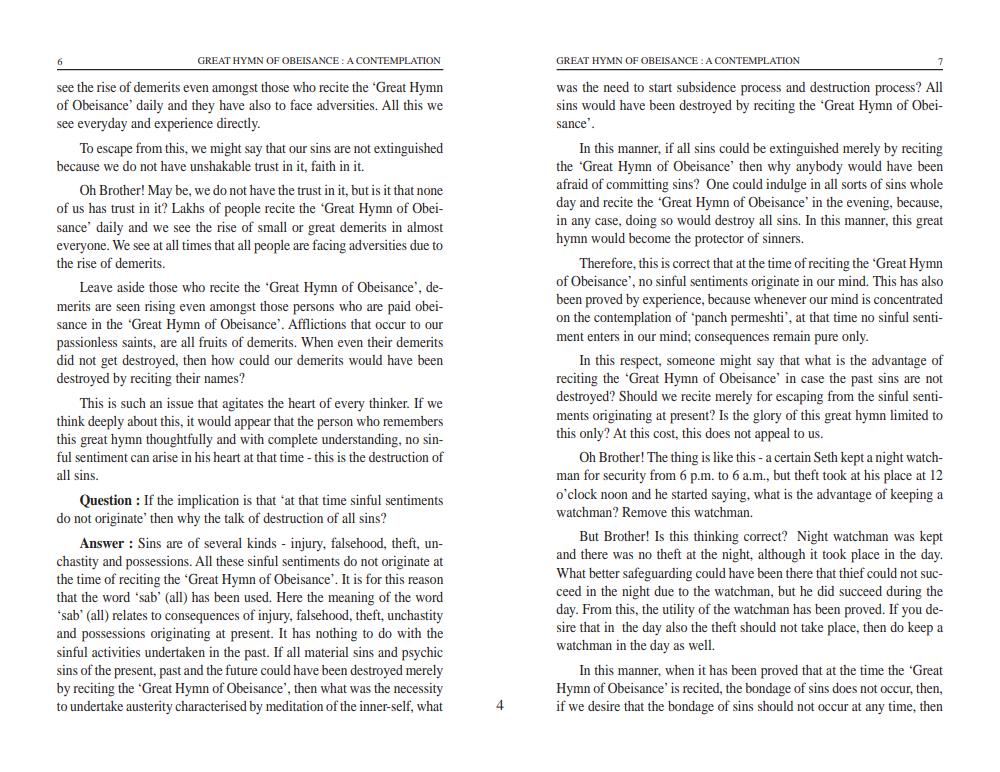Book Title: Namokar Mahamantra Ek Anushilan Author(s): Hukamchand Bharilla Publisher: Todarmal Granthamala Jaipur View full book textPage 5
________________ GREAT HYMN OF OBEISANCE: A CONTEMPLATION GREAT HYMN OF OBEISANCE: A CONTEMPLATION see the rise of demerits even amongst those who recite the "Great Hymn of Obeisance daily and they have also to face adversities. All this we see everyday and experience directly. To escape from this, we might say that our sins are not extinguished because we do not have unshakable trust in it, faith in it. Oh Brother! May be, we do not have the trust in it, but is it that none of us has trust in it? Lakhs of people recite the "Great Hymn of Obeisance' daily and we see the rise of small or great demerits in almost everyone. We see at all times that all people are facing adversities due to the rise of demerits. Leave aside those who recite the 'Great Hymn of Obeisance', demerits are seen rising even amongst those persons who are paid obeisance in the 'Great Hymn of Obeisance'. Afflictions that occur to our passionless saints, are all fruits of demerits. When even their demerits did not get destroyed, then how could our demerits would have been destroyed by reciting their names? This is such an issue that agitates the heart of every thinker. If we think deeply about this, it would appear that the person who remembers this great hymn thoughtfully and with complete understanding, no sinful sentiment can arise in his heart at that time - this is the destruction of all sins. Question: If the implication is that at that time sinful sentiments do not originate' then why the talk of destruction of all sins? Answer : Sins are of several kinds - injury, falsehood, theft, unchastity and possessions. All these sinful sentiments do not originate at the time of reciting the 'Great Hymn of Obeisance. It is for this reason that the word 'sab' (all) has been used. Here the meaning of the word sab' (all) relates to consequences of injury, falsehood, theft, unchastity and possessions originating at present. It has nothing to do with the sinful activities undertaken in the past. If all material sins and psychic sins of the present, past and the future could have been destroyed merely by reciting the 'Great Hymn of Obeisance', then what was the necessity to undertake austerity characterised by meditation of the inner-self, what was the need to start subsidence process and destruction process? All sins would have been destroyed by reciting the "Great Hymn of Obeisance In this manner, if all sins could be extinguished merely by reciting the 'Great Hymn of Obeisance' then why anybody would have been afraid of committing sins? One could indulge in all sorts of sins whole day and recite the "Great Hymn of Obeisance in the evening, because, in any case, doing so would destroy all sins. In this manner, this great hymn would become the protector of sinners. Therefore, this is correct that at the time of reciting the 'Great Hymn of Obeisance', no sinful sentiments originate in our mind. This has also been proved by experience, because whenever our mind is concentrated on the contemplation of "panch permeshti', at that time no sinful sentiment enters in our mind; consequences remain pure only. In this respect, someone might say that what is the advantage of reciting the 'Great Hymn of Obeisance' in case the past sins are not destroyed? Should we recite merely for escaping from the sinful sentiments originating at present? Is the glory of this great hymn limited to this only? At this cost, this does not appeal to us. Oh Brother! The thing is like this - a certain Seth kept a night watchman for security from 6 p.m. to 6 a.m., but theft took at his place at 12 o'clock noon and he started saying, what is the advantage of keeping a watchman? Remove this watchman. But Brother! Is this thinking correct? Night watchman was kept and there was no theft at the night, although it took place in the day. What better safeguarding could have been there that thief could not succeed in the night due to the watchman, but he did succeed during the day. From this, the utility of the watchman has been proved. If you desire that in the day also the theft should not take place, then do keep a watchman in the day as well. In this manner, when it has been proved that at the time the 'Great Hymn of Obeisance' is recited, the bondage of sins does not occur, then, if we desire that the bondage of sins should not occur at any time, thenPage Navigation
1 ... 3 4 5 6 7 8 9 10 11 12 13 14 15 16 17 18 19 20 21 22 23 24 25 26 27 28 29 30 31 32 33 34 35 36 37 38 39 40 41 42 43 44 45 46 47 48 49 50 51 52 53
